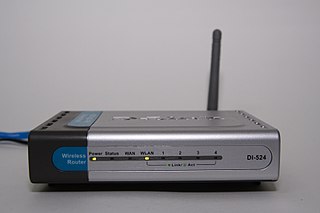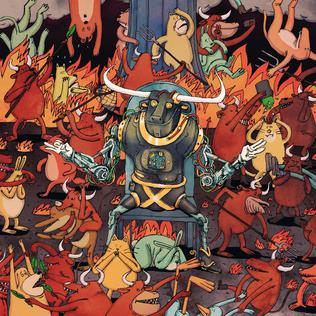| Look up afterburner , afterburning , or reheat in Wiktionary, the free dictionary. |
An afterburner is an addition to a jet engine to increase thrust.
Afterburner may also refer to:
| Look up afterburner , afterburning , or reheat in Wiktionary, the free dictionary. |
An afterburner is an addition to a jet engine to increase thrust.
Afterburner may also refer to:

The Game Boy Advance (GBA) is a 32-bit handheld game console developed, manufactured and marketed by Nintendo as the successor to the Game Boy Color. It was released in Japan on March 21, 2001, in North America on June 11, 2001, in the PAL region on June 22, 2001, and in mainland China as iQue Game Boy Advance on June 8, 2004. The GBA is part of the sixth generation of video game consoles. The original model does not have an illuminated screen; Nintendo addressed that with the release of a redesigned model with a frontlit screen, the Game Boy Advance SP, in 2003. A newer revision of the redesign was released in 2005, with a backlit screen. Around the same time, the final redesign, the Game Boy Micro, was released.
Hotspot or Hot spot may refer to:
Diversity, diversify, or diverse may refer to:
Clarity may refer to:
Pivot may refer to:
Halo generally refers to:

The Game Boy Player (DOL-017) is a GameCube peripheral developed by Nintendo which enables it to play Game Boy, Game Boy Color, and Game Boy Advance cartridges, allowing those games to be played on a television.
The Afterburner lighting kit by Triton Labs is an aftermarket modification to the Game Boy Advance in which a frontlight is installed into the unit.
War is a large-scale armed conflict and the term is used as a metaphor for non-military conflicts.
Ruckus may refer to:

A wireless router is a device that performs the functions of a router and also includes the functions of a wireless access point. It is used to provide access to the Internet or a private computer network. Depending on the manufacturer and model, it can function in a wired local area network, in a wireless-only LAN, or in a mixed wired and wireless network.

"Tell Me When to Go" is the first single from E-40's BME/Warner Bros. debut, My Ghetto Report Card. Keak da Sneak is also featured on the track. It was produced by Lil Jon, and one of the first singles to kick off the hyphy movement on a national level and popularized the phrase "ghost ride the whip". The song reached number 35 in the U.S. and eventually was certified Gold by the RIAA.

Dance Gavin Dance is an American rock band from Sacramento, California, formed in 2005. The band currently consists of vocalists Tilian Pearson and Jon Mess, lead guitarist Will Swan, bass guitarist Tim Feerick, and drummer Matthew Mingus. The band formerly included lead vocalists Jonny Craig and Kurt Travis, and the lineup has changed several times since their inception. Swan and Mingus are the only band members who have appeared on every studio album.

Dragon Ball Z: Harukanaru Densetsu, known as Dragon Ball Z: Harukanaru Goku Densetsu in Japan and Dragon Ball Z: Goku Densetsu in Europe, is a card based role-playing video game for the Nintendo DS. The game takes place from the beginning of the Saiyan Saga to the end of the Cell Saga. Players choose from one of the four main character, Goku, Gohan, Piccolo, and Vegeta. Other characters also appear, but only as either enemies or support cards.

Wireless@SG is a wireless broadband programme developed by the Infocomm Development Authority (IDA) of Singapore as part of its Next Generation National Infocomm Infrastructure initiative, being part of the nation's 10-year masterplan called Intelligent Nation 2015 (iN2015).

Joelle Joanie "JoJo" Siwa is an American dancer, singer, actress, and YouTube personality. She is known for appearing for two seasons on Dance Moms along with her mother, Jessalynn Siwa, and for her singles "Boomerang" and "Kid in a Candy Store". Siwa posts daily videos of her day-to-day life on her YouTube channel, "Its JoJo Siwa". She was included on Time's annual list of the 100 most influential people in the world in 2020.

Afterburner is the ninth full-length studio album by American rock band Dance Gavin Dance. Released on April 24, 2020, on Rise Records, the album serves as a follow-up the group's eighth studio album, Artificial Selection (2018). Recording sessions for the album took place over a five-month period between June and November 2019 with producer Kris Crummett at Interlace Audio in Portland, Oregon, while the vocals were recorded with producer Drew Fulk in Los Angeles, California. The album is considered a musical progression for the band, as the group experimented with funk, Latin, rap, and metalcore which accompany their archetypal post-hardcore and experimental rock style.

The American post-hardcore band Dance Gavin Dance has released nine studio albums, three live albums, one extended play, 41 singles, 22 music videos, one remastered album, and 9 instrumental albums. The band was formed in Sacramento, California in 2005 by guitarist Will Swan, drummer Matt Mingus, and bassist Eric Lodge. Unclean vocalist Jon Mess and clean vocalist Jonny Craig were recruited shortly after. They self-released their debut EP, Whatever I Say Is Royal Ocean, that year, and re-released the EP in 2006 after signing to Rise Records. Their debut studio album, Downtown Battle Mountain, was released May 15, 2007 on Rise.